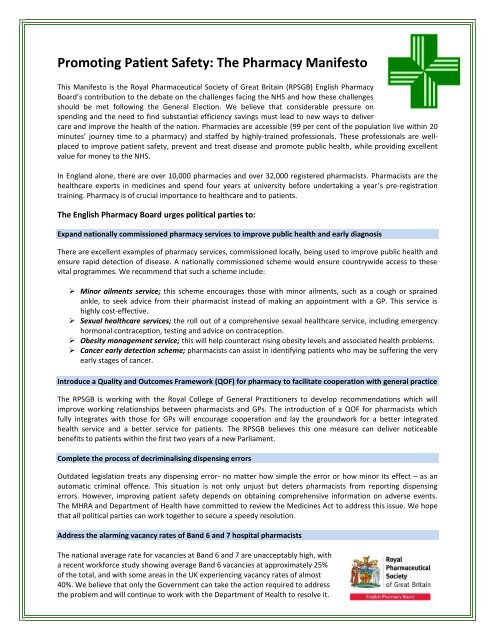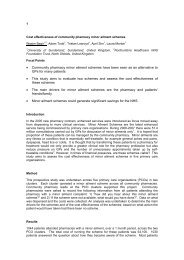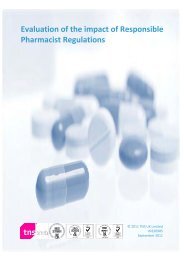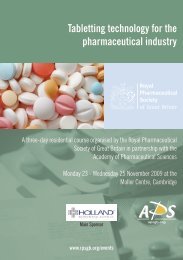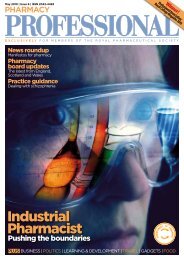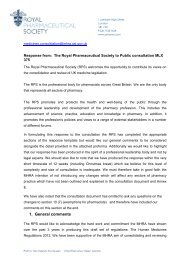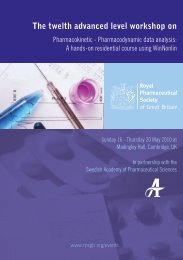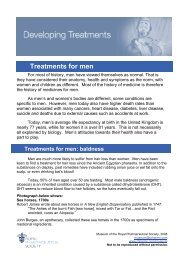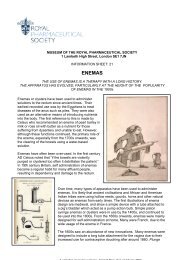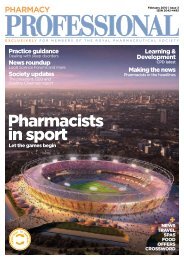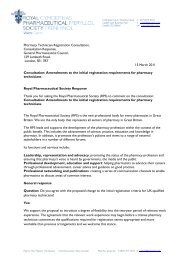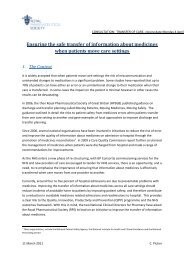Manifesto for Pharmacy - Royal Pharmaceutical Society
Manifesto for Pharmacy - Royal Pharmaceutical Society
Manifesto for Pharmacy - Royal Pharmaceutical Society
Create successful ePaper yourself
Turn your PDF publications into a flip-book with our unique Google optimized e-Paper software.
Promoting Patient Safety: The <strong>Pharmacy</strong> <strong>Manifesto</strong><br />
This <strong>Manifesto</strong> is the <strong>Royal</strong> <strong>Pharmaceutical</strong> <strong>Society</strong> of Great Britain (RPSGB) English <strong>Pharmacy</strong><br />
Board’s contribution to the debate on the challenges facing the NHS and how these challenges<br />
should be met following the General Election. We believe that considerable pressure on<br />
spending and the need to find substantial efficiency savings must lead to new ways to deliver<br />
care and improve the health of the nation. Pharmacies are accessible (99 per cent of the population live within 20<br />
minutes’ journey time to a pharmacy) and staffed by highly-trained professionals. These professionals are wellplaced<br />
to improve patient safety, prevent and treat disease and promote public health, while providing excellent<br />
value <strong>for</strong> money to the NHS.<br />
In England alone, there are over 10,000 pharmacies and over 32,000 registered pharmacists. Pharmacists are the<br />
healthcare experts in medicines and spend four years at university be<strong>for</strong>e undertaking a year’s pre-registration<br />
training. <strong>Pharmacy</strong> is of crucial importance to healthcare and to patients.<br />
The English <strong>Pharmacy</strong> Board urges political parties to:<br />
Expand nationally commissioned pharmacy services to improve public health and early diagnosis<br />
There are excellent examples of pharmacy services, commissioned locally, being used to improve public health and<br />
ensure rapid detection of disease. A nationally commissioned scheme would ensure countrywide access to these<br />
vital programmes. We recommend that such a scheme include:<br />
‣ Minor ailments service; this scheme encourages those with minor ailments, such as a cough or sprained<br />
ankle, to seek advice from their pharmacist instead of making an appointment with a GP. This service is<br />
highly cost-effective.<br />
‣ Sexual healthcare services; the roll out of a comprehensive sexual healthcare service, including emergency<br />
hormonal contraception, testing and advice on contraception.<br />
‣ Obesity management service; this will help counteract rising obesity levels and associated health problems.<br />
‣ Cancer early detection scheme; pharmacists can assist in identifying patients who may be suffering the very<br />
early stages of cancer.<br />
Introduce a Quality and Outcomes Framework (QOF) <strong>for</strong> pharmacy to facilitate cooperation with general practice<br />
The RPSGB is working with the <strong>Royal</strong> College of General Practitioners to develop recommendations which will<br />
improve working relationships between pharmacists and GPs. The introduction of a QOF <strong>for</strong> pharmacists which<br />
fully integrates with those <strong>for</strong> GPs will encourage cooperation and lay the groundwork <strong>for</strong> a better integrated<br />
health service and a better service <strong>for</strong> patients. The RPSGB believes this one measure can deliver noticeable<br />
benefits to patients within the first two years of a new Parliament.<br />
Complete the process of decriminalising dispensing errors<br />
Outdated legislation treats any dispensing error- no matter how simple the error or how minor its effect – as an<br />
automatic criminal offence. This situation is not only unjust but deters pharmacists from reporting dispensing<br />
errors. However, improving patient safety depends on obtaining comprehensive in<strong>for</strong>mation on adverse events.<br />
The MHRA and Department of Health have committed to review the Medicines Act to address this issue. We hope<br />
that all political parties can work together to secure a speedy resolution.<br />
Address the alarming vacancy rates of Band 6 and 7 hospital pharmacists<br />
The national average rate <strong>for</strong> vacancies at Band 6 and 7 are unacceptably high, with<br />
a recent work<strong>for</strong>ce study showing average Band 6 vacancies at approximately 25%<br />
of the total, and with some areas in the UK experiencing vacancy rates of almost<br />
40%. We believe that only the Government can take the action required to address<br />
the problem and will continue to work with the Department of Health to resolve it.
Introduce a Chief Pharmacist role within every PCT to enable effective communication throughout the NHS<br />
A PCT Chief Pharmacist would have a statutory responsibility <strong>for</strong> pharmacy in primary and secondary care in that<br />
geographical area. This role would foster effective communication, enable the transfer of good practice and<br />
provide accountability <strong>for</strong> local health services and the public. They would be responsible <strong>for</strong> overseeing the<br />
effective use of pharmacy within each PCT and achieving cost savings through efficient use of pharmacy-led<br />
services.<br />
Support the introduction of a national accreditation scheme <strong>for</strong> the profession<br />
A national accreditation scheme would allow pharmacists to gain accreditation <strong>for</strong> the delivery of a specific health<br />
service within one PCT that is applicable throughout England. Pharmacists are currently required to seek<br />
accreditation in every PCT they operate. This single measure would remove multiple testing and overbearing<br />
regulation.<br />
Ensure original pack dispensing <strong>for</strong> prescription medicines<br />
Currently community pharmacists will often be <strong>for</strong>ced to split the contents of manufacturers’ original packs when<br />
dispensing medication if the pack size does not correspond to the prescribed quantity. Stopping this practice would<br />
have benefits <strong>for</strong> patient safety because it would ensure that patients received their medication in its original pack<br />
and with the appropriate Patient In<strong>for</strong>mation Leaflet. Original Pack Dispensing would also reduce the workload of<br />
pharmacists who must take time to ‘snip’ the pack, repackage and source an additional Patient In<strong>for</strong>mation Leaflet.<br />
Addressing this would increase the time available to spend providing healthcare advice and support to patients.<br />
Government should examine how original pack dispensing can be supported and pharmacists can be reimbursed<br />
<strong>for</strong> all the medicines they dispense.<br />
Ensure the expansion of electronic care records and the electronic transfer of prescriptions (EPS)<br />
In<strong>for</strong>mation technology (IT) is increasingly being used to support best practice in healthcare. While the RPSGB<br />
acknowledges that it may not be financially viable to continue with some aspects of the NHS IT Programme, we<br />
believe that it is essential that pharmacists gain secure access to a patient’s Summary Care Record.<br />
The current system planned <strong>for</strong> pharmacy allows only an exchange of in<strong>for</strong>mation from GPs to pharmacists, with no<br />
response from pharmacists. A truly interactive system will: reduce prescribing errors, reduce levels of wasted<br />
medicines, and reduce cost. It will also facilitate dialogue between pharmacists and GPs - the most effective<br />
method of improving patient healthcare.<br />
Allow qualified pharmacists to assist those who require urgent treatment <strong>for</strong> extreme pain<br />
Allowing suitably qualified pharmacists to prescribe controlled drugs, such as diazepam and morphine-based pain<br />
relief to patients in appropriate situations, would ensure patients receive their medicines as soon as needed and be<br />
more effective <strong>for</strong> the health service. Currently, patients must wait <strong>for</strong> a doctor or nurse to be available to<br />
prescribe a suitable treatment. Minor legislative changes to the Misuse of Drugs Act 1971 would allow pharmacists<br />
to provide timely help to those in need of pain relief, particularly those in the final stages of life.<br />
About the RPSGB<br />
The <strong>Royal</strong> <strong>Pharmaceutical</strong> <strong>Society</strong> of Great Britain is the only body that represents the wishes of all pharmacists. It<br />
is the professional and regulatory body <strong>for</strong> pharmacists in Great Britain. The primary objectives of the RPSGB are to<br />
lead, regulate, develop and represent the profession of pharmacy.<br />
The RPSGB will demerge in 2010 to <strong>for</strong>m a new professional leadership body and the<br />
General <strong>Pharmaceutical</strong> Council. For further in<strong>for</strong>mation please contact<br />
Charles Willis on: 0207 572 2670 or at: charles.willis@rpsgb.org


